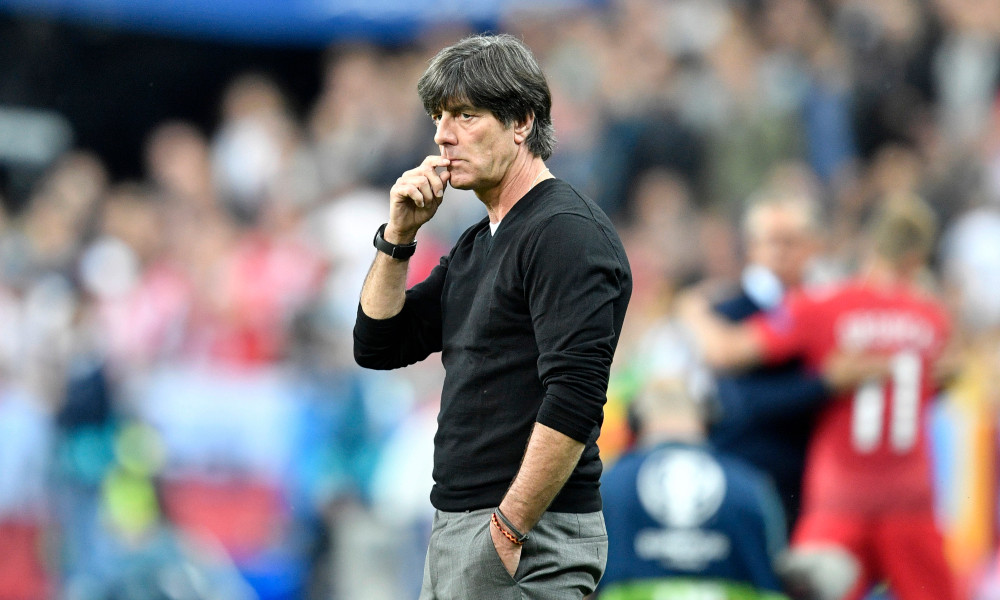Denmark get the better of Czech Republic to reach semifinals
"We make history that we achieved the semifinal now," Stryger said. "It's been many, many years ago since Denmark was there... We know Denmark is going crazy right now."
Germany still hasn’t found a replacement Miroslav Klose and his goals. The World Cup’s all-time leading scorer with 16 goals retired after winning the title in Brazil seven years ago.

Joachim Löw’s 15-year tenure as coach of Germany’s national soccer team is over, and many think it should have ended a long time ago.
The Germans at least advanced from the group stage this time, unlike three years at the World Cup when they were defending champions, but then lost to England 2-0 at Wembley Stadium on Tuesday in the round of 16 of the European Championship.
“I take responsibility for this exit, no ifs or buts,” Löw said Wednesday in his last news conference as Germany coach. “It’s going to take a bit of time to get over this disappointment.”
Advertisement
Löw led Germany to the World Cup title in 2014, and a semifinal appearance at Euro 2016, but his team never recovered from its early exit at the last World Cup.
An attempted reboot after the tournament in Russia failed to yield the desired results. First there was the embarrassing 6-0 loss to Spain last November, and then a 2-1 loss to North Macedonia in World Cup qualifying in March.
Shortly before the second of those two surprising results, Löw announced that Euro 2020 would be his last tournament. And with no need to personally to persevere with the team’s rebuilding process, he recalled veterans Thomas Müller and Mats Hummels for the pandemic-delayed tournament.
“We had or have many players in our ranks who have not yet had much tournament experience. And from my experience I know that it sometimes takes two or three tournaments until the players can perhaps reach their peak, that they can deal with things, with stressful situations during a tournament,” Löw said. “I believe that some players have not yet reached their limit.”
Both Müller and Hummels played key roles in helping Germany advance from a difficult group that included World Cup champion France, European champion Portugal and a well-organized Hungary team. But Germany’s chances at the tournament were ultimately undone by a failure to make more of its opportunities.
“The team threw everything into it. It showed a very good mentality and a great will for all the games,” Löw said. “You could feel it, they wanted to achieve something. But something was missing in certain situations. It wasn’t just the case yesterday, you could feel it after we played 60 or 70 good minutes against Portugal, then again in the game against Hungary.”
Germany still hasn’t found a replacement Miroslav Klose and his goals. The World Cup’s all-time leading scorer with 16 goals retired after winning the title in Brazil seven years ago.
Against England, Müller and Timo Werner failed to convert the best of Germany’s chances. Kai Havertz also went close, but England forwards Raheem Sterling and Harry Kane scored a goal each to show the Germans how it’s done.
Löw’s 198th match in charge was his last.
It was only the second time Germany had failed to reach the quarterfinals of a major tournament since Löw took over as coach after the 2006 World Cup. The problem for Löw is that it was right after the first.
“I think they were 15 very long years for me with many lovely moments and of course disappointments. I think that this team, and several players who will certainly be part of it in the next years, has a very good future,” Löw said. “Of course I wish my successor, Hansi Flick, all the best and lots of success. And yes, my heart still beats in black, red and gold.”
Flick, Löw’s former assistant, will take over for World Cup qualifying. Flick had a very successful spell in charge of Bayern Munich but will inherit the problems Löw faced — most notably the lack of an out-and-out scorer — but he has some excellent young players to work with.
Midfielders Leon Goretzka and Joshua Kimmich, whom Flick already knows from their time together at Bayern, will assume leadership roles. Germany also has some outstanding prospects coming through, like 18-year-old Bayer Leverkusen midfielder Florian Wirtz and Borussia Dortmund forward Youssoufa Moukoko, the Bundesliga’s youngest scorer at 16.
Jamal Musiala showed against Hungary that he can also make a difference for Germany. But Löw only brought the tricky Bayern Munich forward into the match in the 92nd minute against England. It was much too late — for him, for Löw and for Germany.
Advertisement